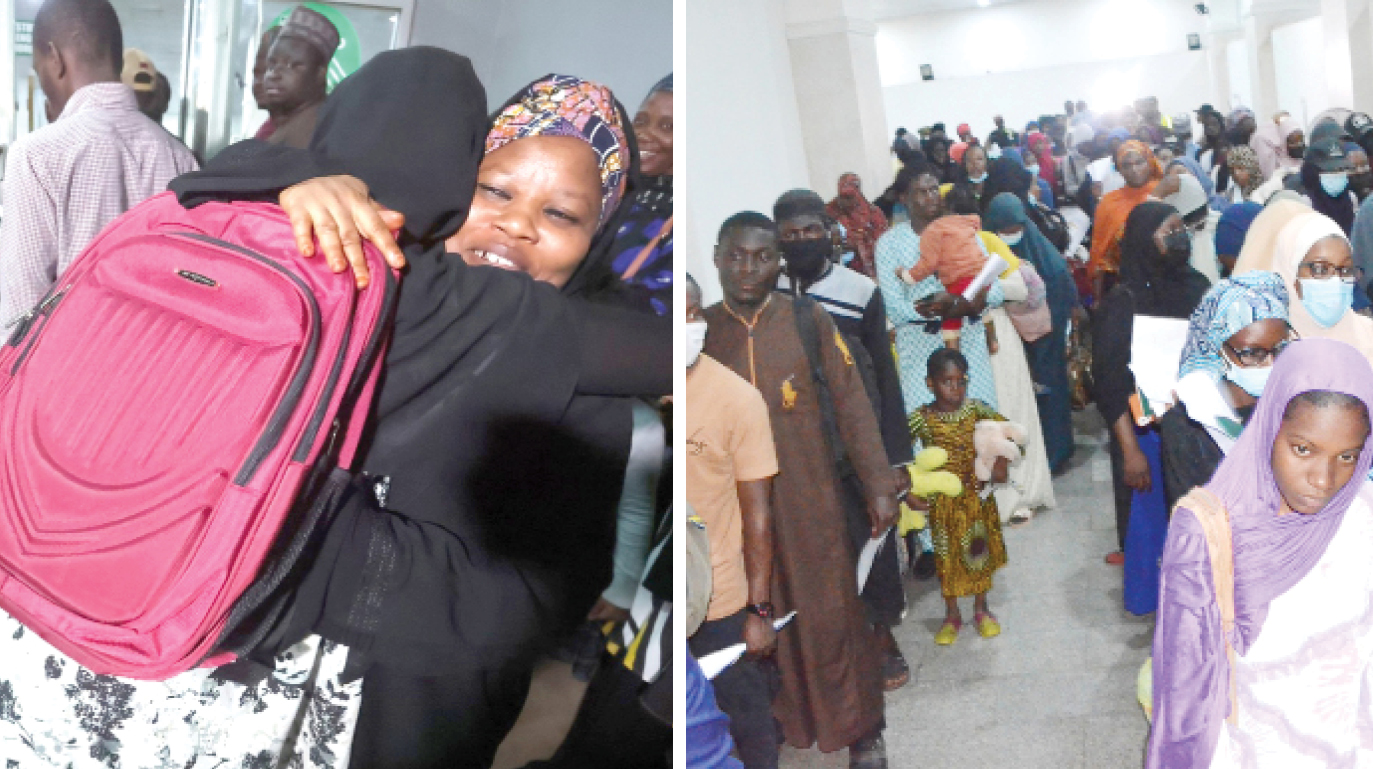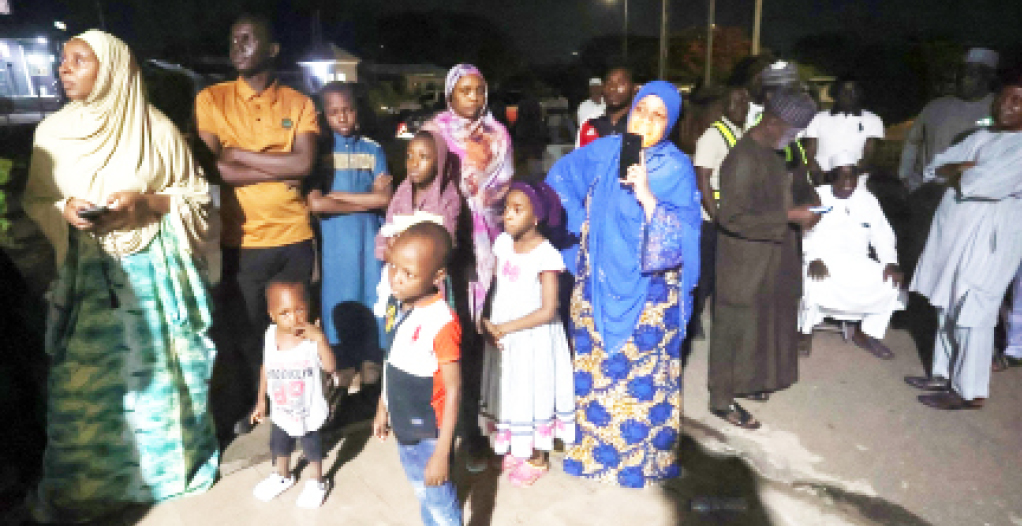May Nigeria never experience war, Sudan returnees pray
Three hundred and sixty four Nigerian evacuees from crisis-ridden Sudan, who landed at the Nnamdi Azikiwe International Airport, Abuja late Wednesday night, narrated their ordeals and prayed that Nigeria never experience war. One of the evacuated Nigerian students, Halliru Bello, who spoke to Daily Trust, prayed that Nigeria never experience war as it could crumble […]

Families and relatives of stranded Nigerians evacuated from Sudan reunite with their loved ones at the Nnamdi Azikiwe International Airport Abuja
Three hundred and sixty four Nigerian evacuees from crisis-ridden Sudan, who landed at the Nnamdi Azikiwe International Airport, Abuja late Wednesday night, narrated their ordeals and prayed that Nigeria never experience war.
One of the evacuated Nigerian students, Halliru Bello, who spoke to Daily Trust, prayed that Nigeria never experience war as it could crumble the citizens and the nation at large.
He said as a medical student at the International University of Africa, Sudan, his academic programme had been put on hold because of the war that suddenly broke out in the country.
“It started at 11am when we started hearing gunshots and after three days, we started experiencing airstrikes and missiles.
Why I offered to evacuate stranded Nigerians in Sudan – Air Peace chairman
May Nigeria never experience war, Sudan returnees pray
“The next thing we were told was not to leave our homes. No access to the market to buy food and other things,” Bello said.
“Our experience was a very terrible one, we don’t pray for anyone ever to experience it. If you were not there, you won’t understand what we experienced.
“May Nigeria do all it takes never to experience war. Academic activities of students would be disrupted suddenly, with no access to food and basic amenities, no movement and you may die in the process when you’re hit by a bullet or missile,” he said.
According to him, missiles and airstrikes were suddenly hitting everywhere and the whole activities in Khartoum shut down.
Bello said after three days, the government of Sudan placed an order for other countries to evacuate their citizens, hence, it was at that point Nigerians in Sudan started making their way to the border between Sudan and Egypt.
He said although the experience was terrifying and frustrating, the Nigerian government made provision for their feeding.
Another student, Aisha Sumaila, who was a nursing student at the International University of Africa in Sudan, said they suffered at the border because the Egyptian officers did not allow them access to the country.
She said the intervention of the Nigerian government eventually made it possible for them to gain access to Egypt.
‘We slept in the open for 8 days’
A footballer and businessman, Steven Chidera Wihioka, said it was a 16-hour journey from Khartoum to Egypt and when they finally arrived at the border, the Egypt officials refused them access, hence they slept outside at the border for eight days because they had nowhere to sleep.
He said there were citizens from other countries who were all trying to leave Khartoum for Egypt.
He said his football career and business, the sale of female wigs, were ended by the war in Sudan.
He said other footballers as well, who signed to play for some clubs, had not accessed their money before the war broke out.

Another returnee, Mrs Amina Balarabe, who worked with the Nigerian Embassy in Sudan, decried her horrible experience, especially being stranded with six children.
She narrated that at the border, the Egypt government insisted that all requirements to gain access into their country be met before they would allow anyone to gain access to their country.
She said survival was difficult because most times, to access basic amenities such as a bathroom, food and water, one had to pay a lot of money, sometimes as much as $50 daily.
A 300-level Physiotherapy student, who simply gave her name as Zainab, said she had lost hope in their survival in Sudan.
She described their condition as terrible, saying they were not treated like humans at the Aswan border in Egypt.
She said: “When the war started, I didn’t know because we were sleeping, we just started hearing gunshots and rockets and we had to leave where we were for safety.
“We had to leave Khartoum for Egypt and it was totally hard for us. Some of us don’t have money and life there was very expensive. There were pregnant women and children who were sick.
“We didn’t think we would survive it because we slept in the car. All of our lives were in the car. Life there was totally hard and they treated us like we are not human beings at the Aswan border in Egypt where we spent six days.”
Another returnee, a student of the International University of Africa, Sudan, Barakat Akinola, narrated: “We just woke up in the morning and started hearing the sounds of bombs and everyone had to start fleeing. It was just like a dream honestly but we thank God we’re all safe.
Another evacuee who wouldn’t want her name in print said: “So, the sound of bullets woke us up that morning. I was really scared and till now I haven’t recovered from the shock because we all thought something was burning not until when the bullets started entering the rooms.
“It was on the 25th of Ramadan, which was the 15th of April. Ha! They really destroyed Sudan, like all the companies, airports and many more were burnt down.”
FG, Dangote Foundation, MTN offer cash, gifts
Meanwhile, the federal government, in collaboration with the Dangote Foundation, gave the returnees N100, 000 each, recharge cards and data.
Speaking while receiving the returnees at the Nnamdi Azikiwe International Airport, Abuja, the Minister of Humanitarian Affairs, Social Development and Disaster Management, Sadiya Umar-Farouk, said they were given the items to enable them to travel to their respective homes and have access to their families through communication.
She said there were a lot of protocols that had to be followed to bring them back to Nigeria.
“We have to go through all the issues to get clearance from the Egyptian authority to enable Nigerians to get access to their country and eventually bring them back.
“War is not a good thing. You can see people who have gone to study, they’ve become refugees all of a sudden. This is an international crisis; also a humanitarian crisis in the sense that people have no food, no water, they don’t know where to go. It’s a very unfortunate and very pathetic situation and Nigerians should pray for peace in our country,” she said.
We need more aircraft for evacuation – FG
The Nigerians in Diaspora Commission said more aircraft were needed to evacuate other Nigerians trapped in Sudan.
The chairman of the commission, Abike Dabiri-Erewa, said this at the Nnamdi Azikiwe Airport, Abuja, before the arrival of the first batch of evacuees.
There are around 1,000 of stranded Nigerians still at Wadi Halfa village in Sudan close to the Egypt border and over 1,500 at Port Sudan waiting to be ferried to Jeddah in Saudi Arabia before being airlifted back home.
Dabiri-Erewa said if four airplanes could be deployed at once, everyone at the Egypt border would get airlifted back home.
She said Egypt officials insisted that the airplanes sent from Nigeria must be able to accommodate the number of Nigerians available to travel or else they would not let them evacuate anyone.
“If four planes go at the same time, they will bring everybody back. So, NEMA has assured that they have done that for Egypt.
“Most importantly also, we hope those over there come back speedily. So, we’re expecting that with the arrangements made by NEMA, it’s going to be more planes because Egypt makes it difficult.
“Egypt says if the number of people you brought is let’s say 200 and the aircraft can only take 150, then nobody will leave. They want you to pick the expected number of people that you are bringing into their border,” she said.
Dabiri said at Port Sudan, the Nigerian government was trying to get tickets as it was more difficult to get a flight to Port Sudan.
“At Port Sudan, we are trying to get tickets because it is even more difficult to get a flight to Port Sudan but they have an airline, so they are processing them now to get them tickets and then they come back home and if other airlines get the landing permit, they will quickly go to help evacuate them.
“At least, they are coming back home and we are glad no life was lost and priority was given to students, women and children. So, let’s just set our eyes on that,” Dabiri-Erewa said.
She said another 3,000 stranded Nigerians were expected to return home.
The stranded Nigerians still in Sudan are complaining of being abandoned.
Abdul-Malik Hassan, who is one of those at Port Sudan, waiting to be evacuated, said: “We’ve not seen any Embassy staff since we came here a day before yesterday [Tuesday].
“They’re lodged in hotels with their family and left us with no food and water.”
Four flights to land today – FG
Director-General, National Emergency Management Agency, Mustapha Habib Ahmed, said four flights would be deployed to evacuate the stranded Nigerians from Sudan today [Friday].
He said to bring the stranded Nigerians to Port Sudan was a two-day journey, hence there was the need to provide food, and water, mobilising their transportation amongst others for them.
He said the four flights would be arriving later today, three from Port Sudan and one from Aswan, Egypt.
Federal Commissioner, National Commission for Refugees, Migrants, and Internally Displaced Persons, Imaan Sulaiman-Ibrahim, said the government would collaborate with various stakeholders to provide support for the students.
Meanwhile, Azman Air Thursday evening confirmed that it was on its way to Egypt to evacuate the second batch of the stranded Nigerians.
Hundreds have been killed and thousands wounded since fighting erupted on April 15 between Sudanese Army Chief, Abdel Fattah al-Burhan and Mohamed Hamdan Daglo, who commands the paramilitary Rapid Support Forces.
The crisis had seen aid workers killed, hospitals shelled, humanitarian facilities looted and foreign aid groups forced to suspend most of their operations.
A ceasefire that came into force on Thursday has already been broken, with airstrikes and heavy shelling reported near the presidential palace in the capital Khartoum in the morning, according to Al-Jazeera.
